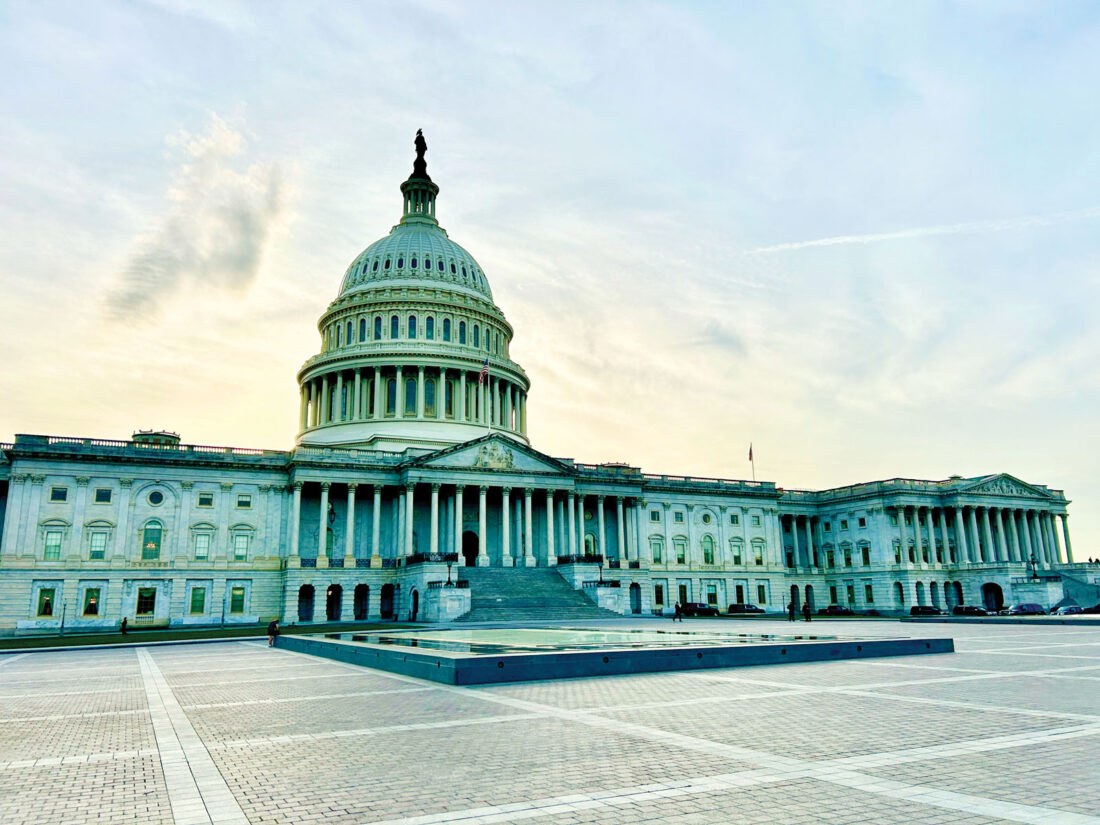A Familiar Feeling: Senators Justice, Capito deal with another potential government shutdown
Reps. Miller, Moore vote for appropriations bill providing funds to Appalachian Regional Council

Members of Congress were back on Capitol Hill this week after a late summer break to begin work to avert a possible government shutdown when the federal fiscal year ends on Sept. 30. (Photo by Steven Allen Adams)
CHARLESTON — Once again, Congress is facing another impending government shutdown by the end of the month if lawmakers can’t come to an agreement on funding packages. The countdown has begun for Tuesday, Sept. 30, when the federal government will run out of money unless Congress passes a short-term continuing resolution or passes a series of spending bills for the federal fiscal year beginning on Wednesday, Oct. 1. “Here we go again,” said U.S. Sen. Shelley Moore Capito, R-W.Va., during a Thursday morning call with West Virginia news reporters. “I know it’s deju vu all over again for many of us in terms of is the government going to shut down again. I’m going to do everything I can make sure the government doesn’t shut down.” Congress averted a government shutdown on March 14 with a last minute 54-46 vote by the U.S. Senate on a continuing resolution, the third such vote during the previous federal fiscal year that began Oct. 1, 2024. That continuing resolution included approximately $1.7 trillion in spending levels, with $13 billion in cuts to non-defense spending and $6 billion in increase to defense spending. Capito, the fourth ranking member of the Senate’s Republican majority leadership and West Virginia’s senior senator, said she believes that her colleagues in the Senate and across the building in the U.S. House of Representatives can come to an agreement on a short-term continuing resolution. “I’ve said before and I’ll repeat that government shutdowns are a waste of time,” Capito said. “They’re a misery march. They result in nothing good and a lot of uncertainty…I feel confident that we’ll have probably a continuing resolution hopefully with some funding bills attached to it at the end of this month.” “I just do not believe that we’re going to do something that’s going to shut the government down,” said freshman U.S. Sen. Jim Justice, R-W.Va., in a phone interview Thursday afternoon. “I know everybody runs through the streets and threatens and does all this and everything, but at the end of the day that is the silliest thing in the world. It would hurt tons and tons of people.” But any agreement on a continuing resolution in the Senate will require cloture, or 60 votes in order to avoid a filibuster by Senate Democrats, before it can be considered on the Senate floor. This drama will take place three months prior to the 2026 midterm election cycle, with lawmakers seeking reelection. Both Republican and Democratic congressional leaders have begun to blame each other if a government shutdown occurs. The Senate has worked on long-term government funding packages. To date, Senate committees have recommended eight funding bills for passage out of 12 total bills, with three funding bills passed by the Senate. The most recent funding package, passed by the Senate in August before summer recess, included funding for the departments of Veterans Affairs and Agriculture. The package also included funding for the Food and Drug Administration, as well as for military construction projects. “I think we’ve done a lot of good stuff,” Justice said. “There are things that surely seem to take way longer to get across the finish line…but I think we’re really, really close to things kind of settling down and doing things more you know from a standpoint of regular order. But there’s been a lot done.” Capito – who chairs the Labor, Health and Human Services, Education, and Related Agencies Subcommittee of the Senate Appropriations Committee – shepherded the passage by her subcommittee of the Labor-HHS budget at $197 billion. “It’s the second largest spending bill next to the (Department of Defense) domestic spending bill so it’s quite large,” Capito said. “We were able to get our bill all the way out of committee bipartisan. We’re waiting for it to go up to the Senate floor, but before we came home in August, we did pass three bills all the way through the Senate, which we did none last year. “If we can get five of these 12 bills done – including my bill, Defense and the three that we’ve already passed – we would be at about 80% of government spending,” Capito continued. “I think we’re on a pathway to be much more functional here. It’s going to depend on what the House does, of course, and how we conference these bills, but…I’m hoping that we can at least get part of the government funded in (fiscal year) 2026 rather than just continuing the funding that we did.” On the House side, lawmakers passed H.R. 4553, the Energy and Water Development and Related Agencies Appropriations Act for fiscal year 2026, in a narrow 214-213 vote. The bill, which appropriated more than $57 billion, included funding for the Appalachian Regional Commission. The bill was supported by U.S. Reps. Carol Miller, R-W.Va., and Riley Moore, R-W.Va. “I proudly voted for the Energy and Water Appropriations bill, today,” said Moore in a statement Thursday afternoon. “This important America First legislation included an amendment I was able to add during markup that restores critical funding for the Appalachian Regional Commission. “West Virginians know that the Appalachian Regional Commission is an invaluable resource for our state that creates jobs, combats addiction, provides job training resources, and improves the Mountain State’s infrastructure,” Moore continued. “I will always fight for West Virginia and will always make sure that Appalachia’s voice is heard in Congress.” Steven Allen Adams can be reached at sadams@newsandsentinel.com.





